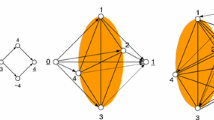Abstract
Solving systems of nonlinear equations is a very challenging problem, particularly as the size of the systems increases, and there is no general numerical method that is both efficient and robust enough to tackle it. On the other hand, metaheuristic algorithms are a broad class of high-level techniques or heuristics for addressing hard and challenging problems. Some of these algorithms are known to produce high-quality approximate solutions for optimization problems, albeit without ensuring optimality. Jaya is a simple and parameter-less metaheuristic algorithm that was found to be effective in solving a variety of real-world problems. However, its effectiveness in solving nonlinear equation systems, perhaps the hardest class of numerical problems to solve, needs to be assessed and verified. This study examines Jaya and a few of its variants with respect to the problem of solving a set of difficult scalable nonlinear equation systems. The results showed that the so-called enhanced Jaya algorithm produced the best results overall, while the modified Jaya algorithm had the worst outcomes, thereby not being suitable for solving the important class of numerical problems considered.
Access this chapter
Tax calculation will be finalised at checkout
Purchases are for personal use only
Similar content being viewed by others
References
Pérez R, Lopes V (2004) Recent applications and numerical implementation of quasi-Newton methods for solving nonlinear systems of equations. Numer Alg 35(2):261–285
Kelley C (2003) Solving nonlinear equations with Newton’s method. SIAM, Philadelphia, PA
Karr C, Weck B, Freeman L (1998) Solutions to systems of nonlinear equations via genetic algorithms. Eng Appl Artif Intell 11(3):369–375
Grau-Sánchez M (2009) Improving order and efficiency: composition with a modified Newton’s method. J Comput Appl Math 231(2):592–597
Choi H, Kim S, Shin BC (2022) Choice of an initial guess for Newton’s method to solve nonlinear differential equations. Comput Math Appl 117:69–73
Dokeroglu T, Sevinc E, Kucukyilmaz T, Cosar A (2019) A survey on new generation metaheuristic algorithms. Comput Ind Eng 137:106040
Lin MH, Tsai JF, Yu CS (2012) A review of deterministic optimization methods in engineering and management. Math Probl Eng 2012:756023
Sihwail R, Solaiman O, Omar K, Ariffin K, Alswaitti M, Hashim I (2021) A hybrid approach for solving systems of nonlinear equations using Harris hawks optimization and Newton’s method. IEEE Access 9:95791–95807
Kumar N (2022) An alternative computational optimization technique to solve linear and nonlinear Diophantine equations using discrete WQPSO algorithm. Soft Comput 26(22):12531–12544
Pan L, Zhao Y, Li L (2022) Neighborhood-based particle swarm optimization with discrete crossover for nonlinear equation systems. Swarm Evol Comput 69:101019
Verma P, Parouha R (2022) Solving systems of nonlinear equations using an innovative hybrid algorithm. Iran J Sci Technol Trans Electr Eng 46(4):1005–1027
Jui J, Ahmad M (2021) A hybrid metaheuristic algorithm for identification of continuous-time Hammerstein systems. Appl Math Model 95:339–360
Suid M, Ahmad M (2023) A novel hybrid of nonlinear sine cosine algorithm and safe experimentation dynamics for model order reduction. Automatika 64(1):34–50
Rao R (2016) Jaya: a simple and new optimization algorithm for solving constrained and unconstrained optimization problems. Int J Ind Eng Comput 7:19–34
Degertekin S, Lamberti L, Ugur I (2018) Sizing, layout and topology design optimization of truss structures using the Jaya algorithm. Appl Soft Comput 70:903–928
Rao R (2019) Jaya: an advanced optimization algorithm and its engineering applications. Springer, Cham, Switzerland
Elattar EE, ElSayed SK (2019) Modified JAYA algorithm for optimal power flow incorporating renewable energy sources considering the cost, emission, power loss and voltage profile improvement. Energy 178:598–609
Zhang Y, Chi A, Mirjalili S (2021) Enhanced Jaya algorithm: a simple but efficient optimization method for constrained engineering design problems. Knowl Based Syst 233:107555
Civicioglu P (2013) Backtracking search optimization algorithm for numerical optimization problems. Appl Math Comput 219(15):8121–8144
Rao R, Saroj A (2017) A self-adaptive multi-population based Jaya algorithm for engineering optimization. Swarm Evol Comput 37:1–26
Yu J, Kim C, Rhee SB (2019) Oppositional Jaya algorithm with distance-adaptive coefficient in solving directional over current relays coordination problem. IEEE Access 7:150729–150742
Liang J, Qu B, Suganthan P, Hernández-Díaz A (2013) Problem definitions and evaluation criteria for the CEC 2013 special session on real-parameter optimization. Technical Report 201212, computational intelligence laboratory. Zhengzhou University, Zhengzhou, China
Bodon E, Del Popolo A, Lukšan L, Spedicato E (2001) Numerical performance of ABS codes for systems of nonlinear equations. Technical Report DMSIA 01/2001, Universitá degli Studi di Bergamo, Bergamo, Italy
Friedlander A, Gomes-Ruggiero M, Kozakevich D, Martínez J, Santos S (1997) Solving nonlinear systems of equations by means of quasi-Newton methods with a nonmonotone strategy. Optim Methods Softw 8(1):25–51
van Hentenryck P, McAllester D, Kapur D (1997) Solving polynomial systems using a branch and prune approach. SIAM J Numer Anal 34(2):797–827
Kelley C, Qi L, Tong X, Yin H (2011) Finding a stable solution of a system of nonlinear equations. J Ind Manag Optim 7(2):497–521
Moré J, Garbow B, Hillstrom K (1981) Testing unconstrained optimization software. ACM Trans Math Softw 7(1):17–41
Yamamura K, Kawata H, Tokue A (1998) Interval solution of nonlinear equations using linear programming. BIT Numer Math 38(1):186–199
Author information
Authors and Affiliations
Corresponding author
Editor information
Editors and Affiliations
Rights and permissions
Copyright information
© 2023 The Author(s), under exclusive license to Springer Nature Singapore Pte Ltd.
About this paper
Cite this paper
Ribeiro, S., Silva, B., Lopes, L.G. (2023). Solving Systems of Nonlinear Equations Using Jaya and Jaya-Based Algorithms: A Computational Comparison. In: Yadav, A., Nanda, S.J., Lim, MH. (eds) Proceedings of International Conference on Paradigms of Communication, Computing and Data Analytics. PCCDA 2023. Algorithms for Intelligent Systems. Springer, Singapore. https://doi.org/10.1007/978-981-99-4626-6_10
Download citation
DOI: https://doi.org/10.1007/978-981-99-4626-6_10
Published:
Publisher Name: Springer, Singapore
Print ISBN: 978-981-99-4625-9
Online ISBN: 978-981-99-4626-6
eBook Packages: Intelligent Technologies and RoboticsIntelligent Technologies and Robotics (R0)




